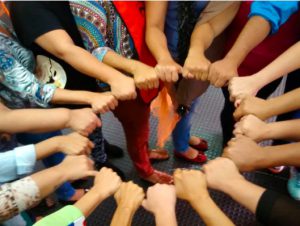Brazil: Public schools of São Vicente transform education through the culture of peace
July 24, 2016

A Culture of Peace committee composed of educators Carla Souza, Damiana Albuquerque, Herbert Santo., Ingrid Geraldo, Lourdes Santo., Myrian Castello, Regina Morais, Sandra de Aragão, Tatiana Rodrigues and Wagner Bessa, is carrying out a program of Training for Peace Education of 60 hours for professionals from all the public education units of São Vicente in partnership with the Secretary of Education.
Vicente
(Click on photo to enlarge)
The main objectives of the training are
– Stimulating new ways of living together;
– Improve group relations and climate at schools;
– Plan positive changes after identification of common problems;
– Create communication networks and undertake ACTIONS;
– Enable an affective perspective at the school units and work collectively on awareness and preparation of actions for local development
– Work for a culture for peace in education in order to assess, sustain, co-create solutions and view results.
To achieve these goals the training consists of seven modules in two stages:
Stage 1:
Contact
Consciousness
Transforming Action
Recognition
Connecting Action
Stage 2:
Practice
Presenting Actions
The modules were inspired by the following organizations and methodologies:
The Pedagogy of Cooperation and Culture of Peace: A method of teaching and cooperative learning, where each and every person is considered to be a master-apprentices engaged in the discovery of themselves and the world, through the encounter with others, in the face of problem situations challenging them to find cooperative solutions for the success and well-being of everyone.
Pallas Athena: The organization Palas Athena promotes and incubates programs and projects in the areas of Education, Health, Human Rights, Environment and Social Promotion, in order to improve human society through the mutual understanding of cultures and the articulation of knowledge.
Oasis Game: The Oasis Game is a support tool for citizen mobilization for the realization of collective dreams.
Nonviolent Communication: supports the establishment of partnership and cooperation relations through effective and empathetic communication. It emphasizes the importance of determining actions the basis of common values.
Restorative justice is a paradigm, the opposite of punishment, based on values, which aims to repair the damages caused by an offense committed by one of the parties involved – victim, offender and community – and, where possible, the reconstruction of broken relationships.
Circle Dances: These promote group unity and community spirit, and interculturalism, as everyone joins hands and supports and assists each other.
Psychomotricity: The method of studying a person through his body movements in relation to his/her internal and external world.
During the modules, the training involved 93 teaching units and about 300 education professionals who were able thereby to promote a culture of peace within and outside the school walls.
A number of activities were carried out by managers in partnership with the community around the school.
Research carried out in the modules showed a high level of involvement and satisfaction of participants who requested the continuation and expansion of training.
The activities were carried out from January to June and will be continued.
For more information, contact comissaoculturadepaz@gmail.com


